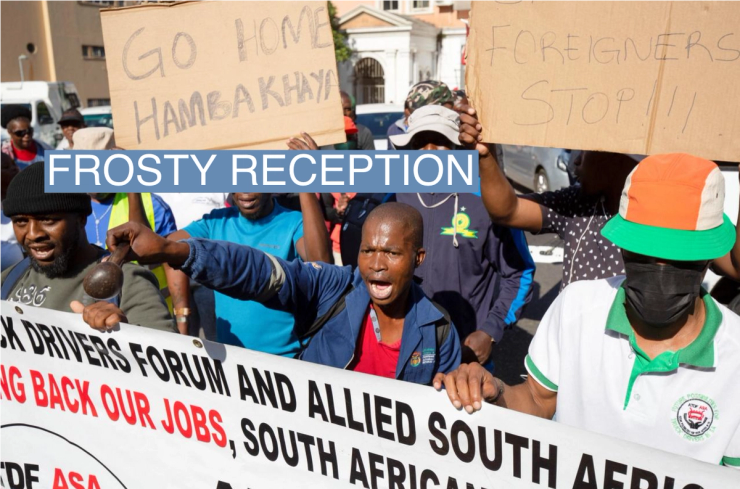The News
JOHANNESBURG — A landmark case over the status of nearly 200,000 Zimbabwean immigrants threatens to fuel growing xenophobia in South Africa and turn migration into a central campaign issue ahead of next year’s elections.
Immigration has become increasingly politicized in South Africa since riots in major cities in July 2021. A number of anti-immigrant vigilante groups have sprung up since then. The best-known of the groups, Operation Dudula, which was formed in impoverished Johannesburg townships two years ago, has in recent months illegally evicted immigrants from their homes, destroyed the stalls of street vendors, and prevented immigrants from accessing clinics and medical care.
Next week, in a court case in Pretoria, civil society groups will challenge the South African 2021 government’s decision to scrap the Zimbabwe Exemption Permit (ZEP), which gives holders the legal right to stay in the country. The ZEP is the latest version of a permit first issued by South Africa in 2009 to legalize the stay of people who fled neighboring Zimbabwe due to that country’s economic crisis.
If the appeal is unsuccessful, 178,000 ZEP holders must reapply for alternative work and study permits, or return to Zimbabwe by June 30.
Jan’s view
The cancellation of the ZEP program is part of a broader crackdown against migration in recent years, both in the political mainstream and through extremist organizations like Operation Dudula — a sentiment driven by the country’s bleak economic situation.
South Africa endured its most ever blackouts in 2022 during an ongoing power crisis and faces record unemployment. These issues were exacerbated by the COVID-19 pandemic. With the 2024 general election approaching and the ruling ANC party expected to lose support, many observers believe immigration will become an even more contentious issue with political parties seeking to be portrayed as tough on immigration to protect the interests of voters.
The likely result is that vigilante gangs will gather support among disenfranchised people, emboldening them to carry out their campaign of intimidation on African migrants in poor areas. The ANC’s waning popularity increases the chance of smaller parties focused on anti-immigrant policies entering a coalition government at a national or local level, or becoming so popular that larger parties co-opt their extremist ideologies.
Zimbabwe’s statistics agency estimates that nearly 800,000 of its citizens live in South Africa, having fled the economic crisis that has gripped their homeland for two decades — although many economists say the real figure is likely to be far higher because official numbers do not include illegal migrants. Most Zimbabweans living in South Africa take low-paid work, leading to resentment from locals in poor areas.
Dan Radebe, Operation Dudula’s national deputy chairperson, claimed there were nearly 5 million Zimbabweans in South Africa, without explaining how he came to that figure. “Obviously they are sitting with fraudulent photocopies, so extending those ZEPs will come at the expense of South Africans who are unemployed,” he told Semafor Africa, again without providing evidence of that claim.
Regardless of the outcome of the appeal, the high-profile case is likely to bring nationalism to the fore and make immigrants a lightning rod for grievances around unemployment, crime and the power crisis as the election cycle goes into full swing.
Know More
South Africa has had a long, uncomfortable history with migration, anti-immigrant rhetoric, and violent xenophobia, predominantly aimed at Black Africans, with major incidents occurring regularly since 2008 when more than 60 people were killed and hundreds displaced.
Politicians have widely dismissed these incidents as purely criminal in nature, while blaming immigrants for a range of political and service delivery failures.
Simba Chitando, a lawyer representing the Zimbabwe Exemption Permit Holders Association (ZEPHA), said the cancellation of the permits sends a signal that Zimbabweans “are a legitimate target to various forms of prejudice, of crime in some cases, and oppression.” However, South Africa’s Department of Home Affairs has said ZEP holders were aware of the temporary nature of the permits.
Room for Disagreement
“My sense is that whilst there is generally negative sentiment towards foreigners, it is still in the minority. It will have political traction, but I think you will find the smaller parties will be fighting over it,” said Piers Pigou, the Southern Africa Programme Head at the Institute for Security Studies.
“I think this will be weaponized in certain communities, there is no doubt about that. But whether that gets further traction and grows as part of a wider political ideal of populist, nationalist politics I don’t know… I do think it has a ceiling,” he said.
The View From Zimbabwe
“We are obviously continuing to say as a pan-African movement that we are all Africans and these borders are forced borders,” said Fadzayi Mahere, the spokesperson for the Citizens Coalition for Change in Zimbabwe.
“Any xenophobic attacks, any attacks that are against foreign nationals whether Zimbabwean or from anywhere else… are indeed a matter of regret,” Mahere said.
Notable
- University of Johannesburg academic Anthony Kaziboni, writing in The Conversation, analyzed five popular myths about immigrants in South Africa.


